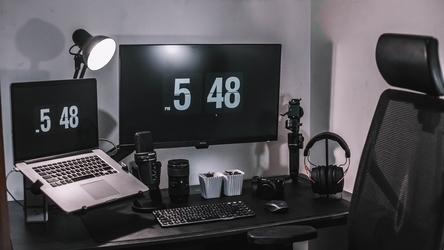
Photo by Brad Neathery on Unsplash
Working remotely offers many perks. You can start your day by having coffee in hand and wearing pajamas. You won’t have to worry about long commuting hours and noisy colleagues.
However, being an efficient remote worker is a challenging task. Frequent interruptions from family members, never-quenching thrust for checking social media, and vague communication with seniors are just a few of the many remote working challenges you have to overcome to be productive.
In today’s article, we will explore 11 strategies to manage your time better while working remotely.
Without further ado, let’s dive in:
1- Set up Your Workstation

Photo by Ebuen Clemente Jr on Unsplash
Your working atmosphere plays a significant role in managing time efficiently. By setting up a workstation in your home, you separate your work life from your personal life. Consequently, you can focus better on your work, and you’ll be more time-efficient.
Are you wondering how you can build a workstation in your home? Well, the first step is to identify the place where you can place your desk. Ideally, you should find a less-visited corner in your home, which has good ambient light and proper ventilation.
Once you have chosen a place for setting up your workstation, the next step is to install your desk and chair there. Move your equipment, notepad, or any other item that matters to your newly built workstation.
You can also install your favorite posters or motivating quotes in your workstation to personalize it.
2- Make a Schedule for the Day

Photo by Jessica Lewis on Unsplash
Having a work schedule is critical for successful time management in remote working.
With smart scheduling, you can maximize your productivity, accomplish your daily goals, and reduce your stress levels. In addition, work scheduling is most likely to leave you with enough time for family and friends.
Ideally, you should schedule your work the day before if you can. Doing so can help you manage your day efficiently, and you can save time that you would otherwise spend on deciding what to do next each time when you finish a task.
Also, when you’re planning your next day, you should keep some buffer time for unpredictable events and interruptions.
You can use a notepad, a Spreadsheet or any online tool to schedule your day. It really doesn’t matter how you do it, doing it actually matters. For example, SEO specialists can use white label SEO dashboard to manage all of their SEO activity by the websites in one place.
3- Prioritize Tasks

Photo by Austin Distel on Unsplash
Indeed, scheduling your work the day before helps, but it won’t make the cut if you don’t prioritize your tasks that you’re going to complete in your working day.
Without proper prioritization, you might feel swamped before even beginning your working day. By prioritizing tasks, you give yourself a starting point, setting the wheels in motion.
Don’t worry. You don’t need hours for prioritizing your tasks. All you need is 10-15 minutes during the evening to sit down and look at the task list for the next day. Then, arrange those tasks in an order that you’re going to follow during your working day. This will help you know which task you should start working on once you complete the task in your hand.
When prioritizing tasks for the day, make sure you don’t attempt multiple complex tasks in a row. Instead, try to mix simple and complex ones if you want to be productive throughout the day.
4- Set Time-limit for Each Task

Photo by Sonja Langford on Unsplash
By setting a time limit for each task, you can better spend your time and keep track of your working day. What’s more, time constraints can force you to stay focused during your day. As a result, you’re less likely to wander off from your work.
It is no-brainer that you have to set aside more time for complex tasks and less time for easy and simple tasks.
You may initially find that some tasks are taking more time than the time you allotted them. Also, you may finish a few tasks more quickly than their allotted time. It is ok. You will get better in setting time-limits as days pass.
5- Use Time Tracking Software

Social media is addictive, and we have an irresistible urge of refreshing our inboxes.
Even though you set time limits for tasks you are going to complete in your working day, it is common to lose track of time. So using time-tracking software can be really helpful in understanding how you spend your working day.
What’s more, a time-tracking software program can help you understand how much time you take to complete different tasks. As a result, you’ll be able to find and minimize inefficiencies and irregularities in your work schedule. And you can schedule and prioritize your working day well to become more time-efficient.
Some time-tracking software applications have many advanced features such as time-sheet creation, invoice generation, etc. So if you’re paid hourly, a time tracking tool can make your job a lot easier by automating many unproductive tasks.
6- Avoid Multitasking

Photo by The Creative Exchange on Unsplash
Just because you’re trying to complete multiple tasks at a time doesn’t mean you will do more in less time. In fact, it can be just the opposite.
When you handle two or more tasks simultaneously, your brain requires time to refocus whenever you make a switch. When you’re continuously shifting focus from one to another, plenty of time is wasted in refocusing.
According to Harvard Business Review article,
“We don’t actually multitask. We switch-task, rapidly shifting from one thing to another, interrupting ourselves unproductively, and losing time in the process.”
The same article reports that our productivity can go down by as much as 40 percent when we’re trying to multitask.
So make a habit of giving your undivided attention to the task in hand. Once it is done, move on to the next task in your list.
7- Enhance Communication

Photo by Chris Montgomery on Unsplash
Lack of understanding, improper explanation, and ambiguous messages can lead to significant delays in day-to-day work. Since you’re working on your own, a slight misunderstanding can hamper the end result drastically.
Therefore, effective communication and collaboration are essential for efficient time management.
Be it assigning tasks, sharing files, or communicating about projects, there should be a well-defined process. You don’t want to lose important messages while juggling with different tools.
You can have internal discussions over Slack, while official communications can be done via emails. But make sure you don’t mix them up.
Also, follow the established rules about calls and meetings so as not to miss any important calls/meetings. This will help you work systematically.
8- Minimize Web Distractions

Photo by Austin Distel on Unsplash
When you’re working remotely, connected to the web throughout the working day, distractions are inevitable.
An Instagram notification chimes, and before you know, you lose an hour browsing your feed. You have the urge to watch one video, and you end up binge-watching the entire evening.
So, you need to find ways to reduce these distractions if you want to be productive. But how?
First, make a list of things that distract you, i.e., mobile push notifications and desktop alerts. Then, you can turn them off or silence them while working. And stop yourself from checking your emails multiple times a day and social media every few minutes.
When you minimize web distractions, your productivity will certainly improve.
9- Take Scheduled Breaks

Photo by freestocks on Unsplash
Taking breaks might sound counterproductive. But you must know that you aren’t designed to work tirelessly. Your body has its physical and cognitive limitations. After a certain period, you lose focus, and your efficiency decreases.
Scheduled breaks will keep you fresh during the entire working day. They also help you stay alert, reduce stress, and prevent burnout. As a result, you’ll be full of energy to handle the tasks at hand.
So, plan brief breaks at regular intervals in addition to breaks for lunch and snacks.
Even if you’re running against a deadline, you must take breaks at scheduled times, though you can limit the duration. Doing so will improve your efficiency.
10- Reward Yourself
Rewards are a great motivator to stay focused. They generate positive emotions. When you plan to reward yourself upon achieving a particular milestone, you stay determined to work hard.
However, rewarding yourself doesn’t mean you can take a movie break after completing a task. Instead, rewards should be reserved only for important milestones.
Finishing up a complex report, developing a helpful work process, or finalizing a fantastic deal are a few examples of events when you can go ahead to reward yourself.
What should you reward to yourself?
You can go for anything that makes you happy and rejuvenated. Treats from your fridge, watching your favorite videos, and listening to your favorite music are just a few good examples of rewards.
11- Take Care of Mental Health

Photo by Nik Shuliahin on Unsplash
Remote working is often a lonely affair. In fact, 20% of remote workers struggle with loneliness. And the ongoing pandemic has made it worse, leaving a significant number of remote workers emotionally vulnerable.
Can you give your hundred percent to the work if you’re not feeling emotionally well? Nobody can.
So it is imperative that you should take care of your mental health while working remotely.
Being part of online communities/support groups, doing meditations, staying in touch with your family members and friends are some good ways to take care of your emotional health.
A sound, healthy mind is a must to become productive.
Final thought
Remote working comes with many advantages and challenges. To make the most out of your day while working remotely, you have to follow a strategic approach. The above-mentioned strategies will help you stay on the right track. As a result, you will be more productive.
Business & Finance Articles on Business 2 Community
(64)







